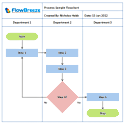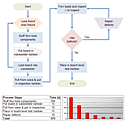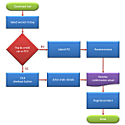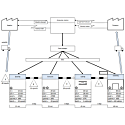Flowcharting in Excel Series
Setting Excel Page Margins for Flowcharts
By Nicholas Hebb
Mind your Margins when Exporting Flowcharts to Word or PowerPoint
This is a short and to the point topic: If you're creating a flowchart in Excel that will be used in other documents, make sure to account for the target document's paper size, margins, and orientation.
Microsoft Excel, Word, and PowerPoint don't have the same page sizes. In fact, Excel and Word 2007 - 2019 applications have different default page margins than their older Office 2003 (and previous) counterparts. The main point here is that flowcharts that fit on a single page in Excel may not fit on a single page in Word or PowerPoint.
Excel Flowchart Wizard
FlowBreeze is a flowchart add-in for Microsoft Excel that makes creating flowcharts simple and pain free. Free 30-Day Trial.To ensure that you are working within Microsoft Word's page margins, change the margins in Microsoft Excel using Page Layout > Margins in Excel 2007 - 2019 and File > Page Setup > Margins in Excel 2000-2003. This will only effect the current file. After changing the margins, do a Print Preview then close the preview screen. This will make the page break lines visible, providing you with boundaries to work within.
PowerPoint, on the other hand, not only has different page margins, but the page orientation is typically landscape. Also, the content boundaries within a slide vary based on the slide type. In short, check your orientation and slide dimensions before trying to create a flowchart in Excel and copying it to PP.
Also, it's a good idea to give yourself a little bit of a buffer between the page breaks and the nearest shapes. The drawing canvases in Word and PowerPoint have small internal margins as well, so you should avoid trying to squeeze it too tight.
About the Author
Nicholas Hebb
Nicholas Hebb is the owner and developer of BreezeTree Software, makers of FlowBreeze Flowchart Software, a text-to-flowchart maker, and Spreadspeed, an auditing and productivity toolset for Microsoft Excel®.



